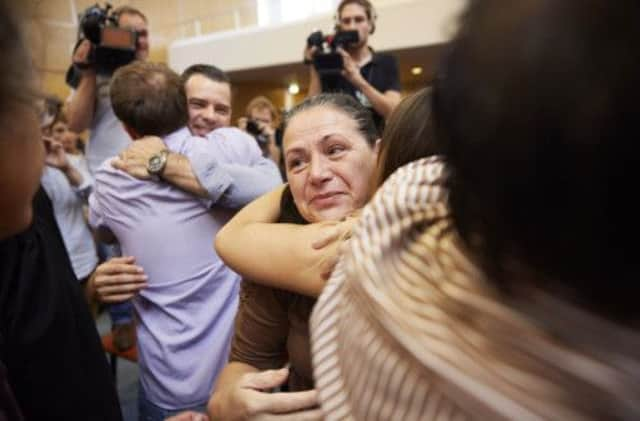Court rules Dutch UN troops to blame for Bosnia killings


The decision upheld a 2011 appeals court judgment that was seen as setting a worrying precedent for countries providing troops for UN peacekeeping forces, because it held the Dutch state responsible for events that happened during a UN mission.
The case was brought by Hasan Nuhanovic, an interpreter whose brother and father were killed, and relatives of Rizo Mustafic, an electrician.
Advertisement
Hide AdAdvertisement
Hide AdThey argued all three men should have been protected by Dutch peacekeepers. Mr Mustafic and Mr Nuhanovic were employed by the Dutch, but Mr Nuhanovic’s father and brother were not. The victims were among thousands of Muslims who took shelter in the UN compound as Bosnian Serb forces commanded by General Ratko Mladic overran Srebrenica on 11 July, 1995. Two days later, the outnumbered Dutch peacekeepers bowed to pressure from Mladic’s troops and forced thousands of Muslim families out of the compound.
Bosnian Serb forces sorted the Muslims by gender, then trucked the males away and started to execute 8,000 of them. The killing was the worst massacre on European soil since the Second World War.
Yesterday’s ruling said in the chaos of the Serb takeover of Srebrenica, UN commanders no longer had control of the troops on the ground, and “effective control” reverted to Dutch authorities in The Hague.
Human rights lawyer Liesbeth Zegveld, who represented the Bosnian families, called the ruling historic because it established countries involved in UN missions can be found legally responsible for crimes, despite the world body’s far-reaching immunity from prosecution.
“People participating in UN missions are not always covered by the UN flag,” she said.
However, Toon Heisterkamp, a supreme court judge, said the narrow focus of the case meant it was unlikely to have far-reaching effects.
Outside the courtroom, Mr Nuhanovic said he was stunned by the ruling, which ends a ten-year legal battle and opens the door to compensation claims against the Dutch government.
“I was thinking about my family, they are dead for 18 years,” he said. “It does not change that, but maybe there is some justice. It should have happened years ago.”
Advertisement
Hide AdAdvertisement
Hide AdThe Dutch government resigned in 2002 after the National War Documentation Institute blamed the debacle on Dutch authorities and the UN for sending underarmed and underprepared forces into the mission and refusing to answer the commanders’ call for air support.
The government accepted “political responsibility” for the mission’s failure and contributes aid to Bosnia, much of which is earmarked for rebuilding in Srebrenica. However, it has always said responsibility for the massacre itself lies with the Bosnian Serbs.
The three men were among the last to be expelled, the 2011 ruling said, and by that time the peacekeepers – known as “Dutchbat” for Dutch battalion – already had seen Bosnian Serb troops abusing Muslim men and boys and should have known they faced the threat of being killed.